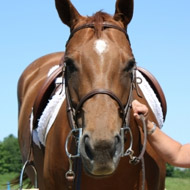
Calls for guidance on equine care and funding for education
The creation of a report highlighting the need for better horse care guidance throughout Europe is to be proposed by Julie Girling MEP.
The proposal, to be presented at the Coordinators of Agriculture Committee of the European Parliament, will also call for funding for education programmes on equine welfare.
Following her presentation at European Pet Night last Wednesday (25 February), Julie Girling said: “Unfortunately, equidae continue to suffer welfare problems across the entire EU. A number of areas of concern have become clear and need to be addressed rapidly. These include at the worst complete neglect but also the keeping of equidae in too small a space, confining them for long periods without access to turnout, and a lack of social interaction. Most of these problems can be addressed by educating their owners.”
Julie added that the treatment of working equines is also a cause of concern in a number of Member States, as is a lack of access to professionals such as veterinary surgeons, farriers and saddlers.
She said: "A number of equine organisations have expressed their concerns to me about training and handling methods, the use of equidae for meat and welfare problems in sport.”
Animal welfare charity Eurogroup for Animals has welcomed the announcement, saying they are "very pleased" that Julie Girling has decided to champion the issue and to "put pressure" on the commission to act.
Director at Eurogroup for Animals Reineke Hameleers, commented: “Equidae are used in many different ways across the Union but the welfare problems that they face are often remarkably similar. What is clear is that no Member State is entirely free of welfare issues, and no Member State should be complacent about the welfare of their equidae.
"We hope that the report of Ms Girling will be taken seriously and show that education on responsible ownership can improve the welfare of the millions of equidae living in the EU in a very short time."



 The Animal and Plant Health Agency (APHA) has updated its online reporting service for dead wild birds.
The Animal and Plant Health Agency (APHA) has updated its online reporting service for dead wild birds.